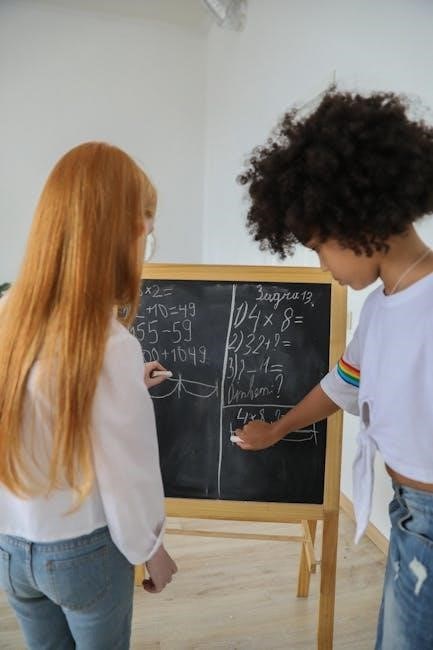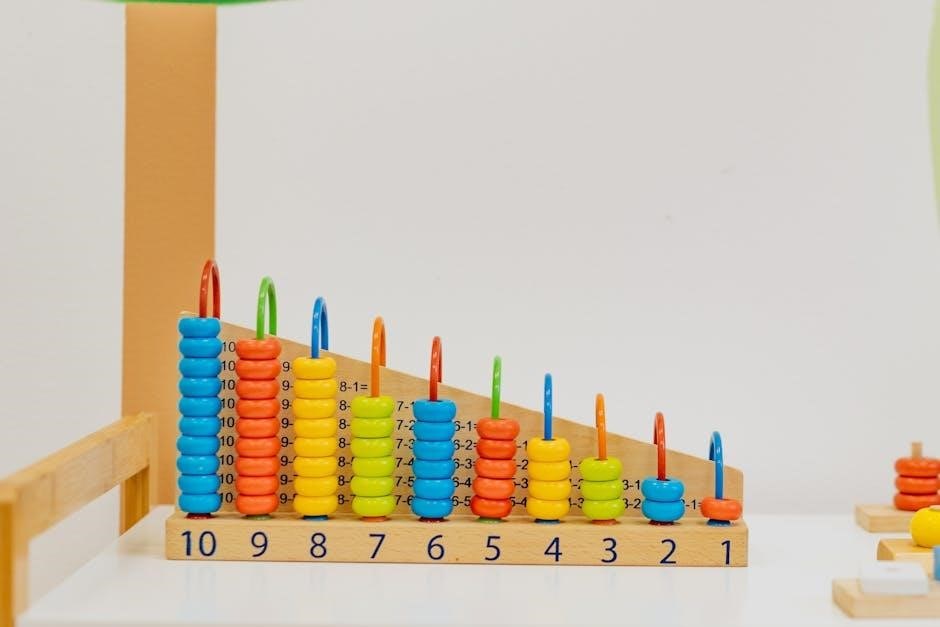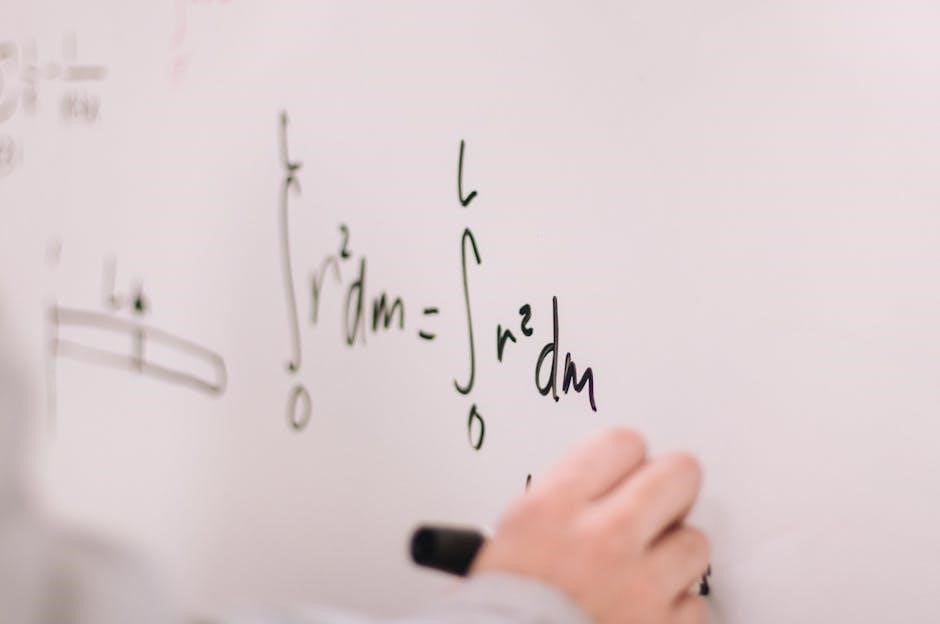Arithmetic puzzles are engaging mathematical challenges that enhance problem-solving skills and logical thinking. Available as free PDFs, they offer fun and educational activities for learners of all ages.
What Are Arithmetic Puzzles?
Arithmetic puzzles are engaging mathematical challenges that involve solving problems using basic arithmetic operations like addition, subtraction, multiplication, and division. These puzzles often present numbers in unique or logic-based scenarios, requiring critical thinking and problem-solving skills. They can range from simple calculations to complex equations, making them suitable for learners of all skill levels. Available as PDFs, arithmetic puzzles are widely used for educational purposes, offering a fun and interactive way to practice math. Examples include KenKen, Sudoku, and logic grids, which combine arithmetic with reasoning.
Importance of Arithmetic Puzzles in Education
Arithmetic puzzles play a vital role in education by enhancing mathematical fluency and problem-solving abilities. They foster critical thinking and logical reasoning, making math engaging and accessible for students. These puzzles, available as PDFs, provide a structured yet fun way to practice arithmetic skills. Regular use of such resources improves cognitive development, boosting confidence and academic performance. Educators often incorporate arithmetic puzzles into curricula to create interactive learning experiences, ensuring students develop a strong foundation in mathematics while enjoying the process of learning.
Types of Arithmetic Puzzles
Arithmetic puzzles vary widely, from basic operations to complex logic-based challenges. They include algebraic problems, number sequences, and riddles, catering to different skill levels and interests.
Basic Arithmetic Operations Puzzles
Basic arithmetic puzzles focus on fundamental math operations: addition, subtraction, multiplication, and division. These puzzles often involve simple numerical challenges, such as solving equations or completing sequences. They are designed to reinforce foundational math skills in a fun and interactive way. Examples include solving for missing numbers in equations or arranging numbers to meet specific criteria. Resources like “Math Games ⏤ Addition, Subtraction, Multiplication, Division” and “Number Games 1-150” offer a variety of puzzles for different skill levels. These activities are particularly useful for younger learners or those looking to strengthen their basic math proficiency.

Algebraic and Advanced Arithmetic Puzzles
Algebraic and advanced arithmetic puzzles challenge solvers with complex equations and multi-step problems. These puzzles often require knowledge of variables, algebraic expressions, and higher-order thinking. Examples include solving for variables in equations or manipulating algebraic expressions to find solutions. Resources like “Puzzles to Puzzle You” and “Mathematical Puzzles and Games” provide advanced puzzles that test problem-solving skills and mathematical reasoning. These puzzles are ideal for those seeking to enhance their algebraic proficiency and tackle more challenging math problems.
Logic-Based Arithmetic Puzzles
Logic-based arithmetic puzzles combine numerical challenges with deductive reasoning, requiring solvers to think critically. Examples include Sudoku, KenKen, and number sequences. These puzzles often involve patterns, grids, or riddles that demand both arithmetic skills and logical thinking. Resources like “Puzzles to Puzzle You” and “Mathematical Puzzles and Games” offer a variety of logic-based puzzles in PDF formats. They are designed to enhance problem-solving abilities and are suitable for learners of all skill levels, making them a fun and educational tool for mental sharpness.

Resources for Arithmetic Puzzles PDF

Discover a wealth of arithmetic puzzle resources online, featuring free PDFs like “Puzzles to Puzzle You” and “KenKen Puzzles” for engaging math practice.
Popular Arithmetic Puzzle Books Available as PDF
Popular arithmetic puzzle books like “Puzzles to Puzzle You” by Sakuntala Devi and “KenKen Puzzles” are widely available as free PDF downloads. These books offer a variety of math challenges, including basic arithmetic operations and advanced logic-based problems. They are designed to enhance problem-solving skills and make learning mathematics enjoyable. Additionally, resources like “Math Puzzlers” and “The Big Logic Puzzle Extravaganza” provide comprehensive collections of arithmetic puzzles suitable for all skill levels. These PDFs are easily accessible online, making them ideal for homeschooling, self-study, and classroom activities.
Free downloadable arithmetic puzzle worksheets are readily available online, offering a variety of engaging math activities. Resources like “Number Games 1-150” and “Amazing Mazes” provide interactive challenges for children. Websites feature printable PDFs that cover addition, subtraction, multiplication, and division. These worksheets are designed to make learning fun and accessible, catering to different age groups and skill levels. They are ideal for homeschooling, classrooms, and self-study, promoting cognitive development and problem-solving abilities in an enjoyable way. Creating your own arithmetic puzzle PDF is a straightforward process. Start by designing puzzles using basic arithmetic operations like addition, subtraction, multiplication, and division. Use templates or tools like Free PDF Downloader to format your content. Include a variety of challenges, from simple to complex, to cater to different skill levels. Add clear instructions and solutions for convenience. Finally, convert your document into a PDF and share it for free or use it for personal learning. This allows you to customize puzzles according to specific needs or preferences. Solving arithmetic puzzles enhances problem-solving skills, improves logical thinking, and boosts mental acuity. They foster cognitive growth and make learning mathematics engaging and enjoyable for all ages. Arithmetic puzzles significantly enhance cognitive development by improving memory, concentration, and critical thinking. They sharpen problem-solving abilities, fostering logical reasoning and mental acuity. Engaging with these puzzles strengthens the brain’s capacity to process numerical information efficiently, making them an excellent tool for learners of all ages. Regular practice builds confidence and a deeper understanding of mathematical concepts, while also enhancing overall intellectual growth. These puzzles are both challenging and rewarding, providing a fun and educational way to develop essential cognitive skills. Arithmetic puzzles are a powerful tool for enhancing problem-solving skills, encouraging analytical thinking and creativity. They challenge individuals to approach problems from multiple angles, fostering resilience and adaptability. By breaking down complex scenarios into manageable steps, these puzzles teach methodical reasoning and strategic planning. Regular engagement with arithmetic puzzles sharpens the ability to identify patterns and connections, leading to improved decision-making and a stronger foundation in mathematical logic. This skill development is invaluable for both academic and real-world challenges. Arithmetic puzzles are integrated into educational curricula to make learning interactive and enjoyable. They enhance numeracy skills and encourage critical thinking among students across various grade levels effectively. Arithmetic puzzles are increasingly used in math classrooms to enhance engagement and understanding. Teachers incorporate puzzle-based activities to make learning interactive and enjoyable. These puzzles, often available as free PDF resources, align with curriculum goals and cater to diverse learning styles. By solving arithmetic puzzles, students develop problem-solving skills, critical thinking, and mathematical fluency in a fun and challenging environment. This approach fosters collaboration and creativity, making math lessons more dynamic and effective for students of all ages and skill levels. Arithmetic puzzles are a valuable tool for homeschooling and self-study, offering an engaging way to learn math concepts. Free PDF resources provide a variety of puzzles that cater to different skill levels and learning styles. These activities enhance problem-solving skills, logical thinking, and math fluency while making learning fun. Parents and students can easily access these materials online, making them a convenient and effective way to supplement traditional learning methods. They also allow for personalized learning, enabling learners to progress at their own pace. Advanced arithmetic puzzles challenge experts with complex problem-solving and logical thinking. Free PDF resources offer intricate puzzles designed for those with strong math foundations and analytical skills. Complex arithmetic puzzles challenge experts with intricate calculations and logical reasoning. Examples include multi-digit operations, such as dividing a large number across multiple steps, or solving equations with missing digits. Kenken puzzles, requiring arithmetic operations within grids, are popular for advanced problem-solvers. Additionally, number placement puzzles, like arranging digits to satisfy multiple conditions, test cognitive abilities. These puzzles, often found in free PDF resources, provide a stimulating way to enhance mathematical proficiency and logical thinking for experienced learners. To solve complex arithmetic puzzles, start by breaking down problems into smaller, manageable parts. Use estimation to identify plausible answers before calculating precisely. Work backwards from the solution when possible, especially in algebraic puzzles. Practice mental math to improve speed and accuracy. Regularly solving simpler puzzles sharpens logical reasoning and pattern recognition skills. Utilize free PDF resources like Kenken and Sudoku for practice. Always verify answers by reversing calculations to ensure accuracy. Persistence and a systematic approach are key to mastering challenging puzzles. Arithmetic puzzles enhance math proficiency and logical thinking, making them essential for competitive exams. Regular practice improves mental sharpness and time management, ensuring exam readiness. Arithmetic puzzles play a vital role in math competitions by sharpening problem-solving skills and fostering logical thinking. They enhance speed, accuracy, and adaptability, essential for competitive environments. Puzzles like KenKen and number-based riddles challenge participants to think creatively while adhering to mathematical principles. Regular practice with such puzzles improves mental agility and prepares students for diverse problem types, making them indispensable tools for exam preparation. These puzzles also boost confidence and reduce anxiety, enabling competitors to perform at their best. To excel in puzzle-based exams, students should adopt a structured approach. Regular practice with arithmetic puzzles PDFs enhances problem-solving speed and accuracy. Focusing on number games and logic-based puzzles strengthens mental arithmetic and critical thinking. Solving timed exercises simulates exam conditions, improving time management; Analyzing past papers and reviewing mistakes helps identify weak areas. Utilizing free PDF resources like “Puzzles to Puzzle You” and “Math Games” provides diverse practice materials. Consistent effort and a strategic study plan are key to achieving success in these challenging assessments. Arithmetic puzzles have deep cultural roots, appearing in various educational systems worldwide. They foster cognitive growth and logical reasoning, making them a cornerstone of intellectual development for centuries. Arithmetic puzzles trace their origins to ancient civilizations, where mathematical riddles and games were used to sharpen intellectual skills. These puzzles evolved over centuries, with examples like magic squares and cryptarithmetic puzzles gaining popularity. In the mid-20th century, mathematicians and educators began compiling these puzzles into structured formats, often distributing them as PDF resources for educational purposes. Today, they remain a timeless tool for cognitive development, bridging the gap between entertainment and learning across cultures. Arithmetic puzzles are cherished across various cultures, reflecting unique mathematical traditions. In Japan, puzzles like KenKen emphasize mental calculation and logic. India’s Vedic mathematics inspires arithmetic riddles, while Europe’s Sudoku and magic squares highlight numerical patterns. These puzzles, often shared as PDFs, showcase diverse problem-solving techniques, making them accessible and engaging worldwide. They not only entertain but also preserve cultural mathematical heritage, fostering a global appreciation for arithmetic as both art and science.Free Downloadable Arithmetic Puzzle Worksheets
How to Create Your Own Arithmetic Puzzle PDF
Benefits of Solving Arithmetic Puzzles
Cognitive Development Through Arithmetic Puzzles
Improving Problem-Solving Skills with Puzzles

Arithmetic Puzzles in Educational Curriculum

Integration of Puzzles in Math Classrooms
Using Puzzles for Homeschooling and Self-Study

Advanced Arithmetic Puzzles for Experts
Complex Arithmetic Puzzle Examples
Solving Challenging Arithmetic Puzzles: Tips and Tricks
Arithmetic Puzzles in Competitive Exams
Role of Arithmetic Puzzles in Math Competitions
Preparation Strategies for Puzzle-Based Exams

Cultural Significance of Arithmetic Puzzles
Historical Background of Arithmetic Puzzles
Arithmetic Puzzles in Different Cultures


